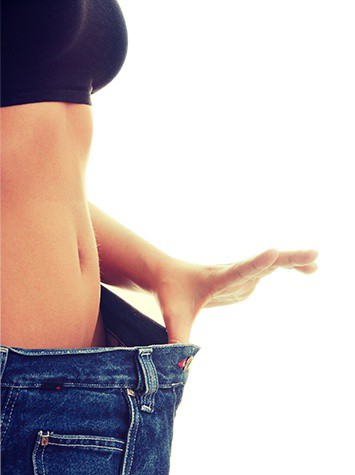As women, we are constantly complaining about bloating, sluggish movements, fatigue and recurring headaches. In addition, our favorite pair of pants that used to fit us two days ago doesn’t fit anymore, or fits with a lot of difficulty, and the button might pop at any second.
Sometimes we get confused and we’re full of self-doubt. We start backtracking and thinking of every single item we’ve had for breakfast, lunch and dinner the day before. After that, the usual scenario is that you barely ate, maybe you went wild and had one small bar of chocolate or one small spoon of rice with lunch.
The plan would be to call a nutritionist ASAP to set an appointment. And the primary complaint would be that although you’re not eating much, you seem to be gaining about two kilos every two days and then losing one in a less than a week.
So how would you know if it’s weight gain due to water retention and hence the bloating, or increased calorie intake or decreased metabolism? Which one is it?
The key to fighting water retention is an elimination diet. By discovering which food items that cause the body to develop an allergic reaction thus increase the body’s water content. These foods can vary from gluten-containing foods such as bread and pasta, to coffee or lactose in milk. It could also be a certain food item which you are daily consuming or adding in your diet such as smoked turkey or even nuts.
By eliminating the food item, your body will lose the acquired water content. And with that, weight loss will occur. There are certain lab tests that will confirm the existence of an allergy.
The other reason for unexplained water retention is of course the famous pre-menstrual syndrome better known as PMS, PCO (Polycystic ovarian syndrome). Other reasons may be a kidney or a thyroid problem.
Food items that may increase water retention:
Increased or excessive salt in food or salty items such as pickles.
Canned soup or frozen vegetables. They may include excessive sodium.
Gluten intolerance. Gluten is present in bread or pasta.
Lactose intolerance. Lactose is present in milk or cheese.
Food items that decrease water retention:
Bananas. The more potassium the better. And bananas plenty of potassium!
Cranberry juice and cabbage are natural diuretics. So make sure to consume them a lot.
Yoghurt will treat stomach bloating and will help it to decrease.
If water retention and bloating are caused by anything other than kidney problems, then drinking 8-10 glasses of water will help decrease water retention.
Increased Vitamin C intake through supplements, oranges, lemons or guavas will decrease water retention.
Parsley and Celery tea is a quick and easy remedy to decrease water retention.
Also, lift your legs. As ankles may swell badly. And make sure to take a short walk every hour to keep the circulation going.
Hopefully after following the previous, tips bloating will decrease. If not, then go ahead and double check using lab tests to find out if it’s a food allergy or just the good old PMS.
Dr. Sherine El Shimi is an MD and holds an Msc in Clinical Nutrition from the University of Roehampton For more information please visit the Facebook page:
https://www.facebook.com/DrSherineElShimiNutrition?ref=hl

